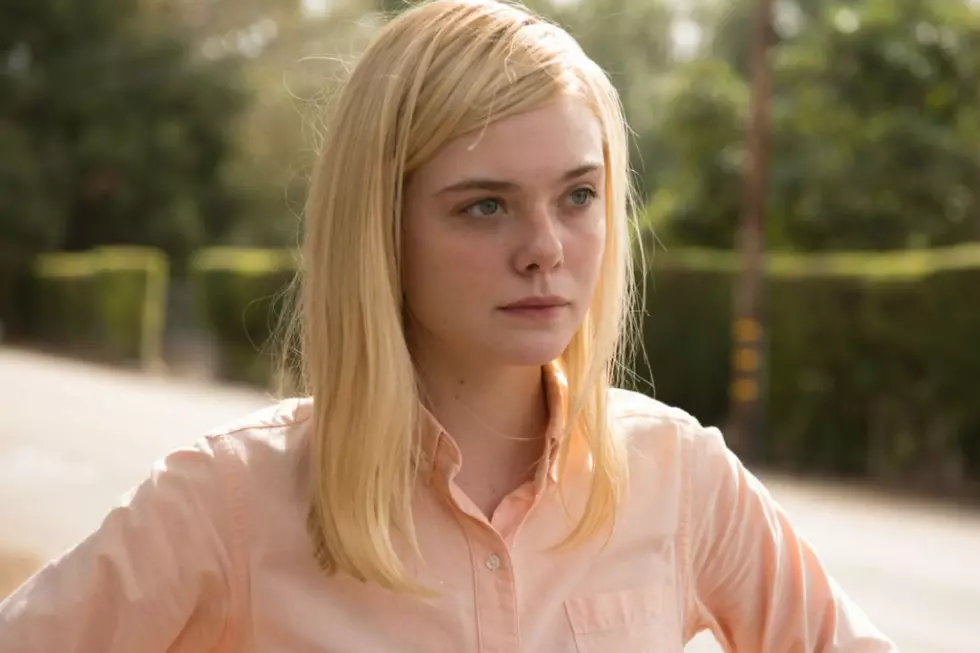
‘The Neon Demon’ Review: Beauty and Brains From the Director of ‘Drive’
There’s a moment early on in The Neon Demon, in which a fantastically icy Abbey Lee tells Elle Fanning’s doe-eyed aspiring model the first thing women notice about other women. Basically it’s: “Who is she f—ing? Could I f— them? How high can she climb? And is it higher than me?” It’s the closest thing to a thesis statement you’ll find in Nicolas Winding Refn’s latest film, a stylishly surreal effort that’s equal parts deranged fairy tale and devious satire, where all that glitters is ultimately cold.
Like Refn’s previous efforts, The Neon Demon’s plot is quite simple: A young model moves to Los Angeles to pursue her dream and becomes immersed in a sleek, shallow world in which beauty — to paraphrase a fashion designer played by Alessandro Nivola — isn’t everything, it’s the only thing. Fanning plays the young protagonist, a Goldilocks thrust into the den of three slender and very hungry bears. Two models (Abbey Lee and Bella Heathcote) and a makeup artist (Jena Malone) extend their “friendship” to the naive newcomer, their unnerving motives slowly becoming as clear as their perfect, pore-less skin.
It makes sense that the man behind the similarly elusive Only God Forgives and the stylishly stoic Drive would direct a film titled The Neon Demon — so named for the overt connotation of possessive beauty, its thematic and visual contrasts, and, well, the lighting. Like its predecessors, The Neon Demon is aesthetically seductive but distinctly distant, like a beautiful lover who rolls over and leaves your side of the bed feeling empty. Although I’m sure Refn wants people to enjoy his film, it feels like something that’s not begging for the viewer’s approval.
Despite its glossy surface, The Neon Demon is as thematically complex as Only God Forgives, and the two films share a certain uncanny quality that Sigmund Freud once explored in an essay on The Sandman, a German story about a lifelike doll. Where Only God Forgives was preoccupied with masculinity, The Neon Demon is fascinated by femininity; specifically, the viciously competitive nature of women. For men, the drive to compete is a primitive one, but for women it’s been manufactured by an insidious beauty industry that trains its target audience like dogs bred to fight in pits.
That early moment between Lee and Fanning takes place in a bathroom, a place for women to commune and commiserate, to judge and be judged. It’s there that Lee delivers a sharp observation about an industry that’s both dominated by and designed to manipulate women. When a beautiful woman enters a room, the first thought many women have isn’t reverence or admiration, but a deep, dark, hidden desire to tear her down.”
Mirrors play a key role in that scene and throughout the film as the characters communicate through their own images, conducting entire conversations in front of echoes of themselves, mirrors inside of mirrors that stretch on in a narcissistic illusion of eternity — immortality. Hunger is also imperative, though food is scarce right up until a grotesquely clever climax in which only someone who is painfully, desperately hungry can survive.
Perhaps the most apt cinematic point of comparison for The Neon Demon is Showgirls, Paul Verhoeven’s disgustingly glitzy satire of fame. Both films are as fascinated with mirrors as they are with their own reflections, and both directors are preoccupied with the ways in which fame-hungry women destroy each other in a disturbing, near-mystical effort to absorb each other’s power. These are darkly humorous films that present deformed versions of familiar fairy tale tropes, transported to contemporary settings where ugliness is disguised in glitter. Ultimately, Refn’s film will be as casually dismissed and misunderstood as Verhoeven’s trash-masterpiece.
If you need further evidence of the demented sense of humor at play, look no further than Keanu Reeves, who has a small role as the sleazy owner of a motel. In typical Reeves fashion, the actor delivers hilariously bizarre one-liners that belong in a waking nightmare designed by David Lynch or Werner Herzog. But Reeves’ exaggerated line readings are counterbalanced by the women around him: Elle Fanning is nuanced and otherworldly in her transformation from naive waif to seductive narcissist; a soft contrast to the film’s sharp, angular aesthetic. Bella Heathcote is a deliberately manufactured porcelain doll whose cracks are painfully obvious; Abbey Lee is a gloriously vicious monster who would be the film’s surprising MVP were it not for Jena Malone, whose controlled performance is like a snake elegantly coiling itself for the strike. The ones you least expect to attack are always the ones you should the most.
Set to an electrifying score by frequent Refn collaborator Cliff Martinez (which may be his best yet), The Neon Demon is as deceptive as shattered glass, with a brilliant beauty so mesmerizing that you don’t notice its murderously sharp edges until you’re bleeding all over the floor.
More From ScreenCrush









